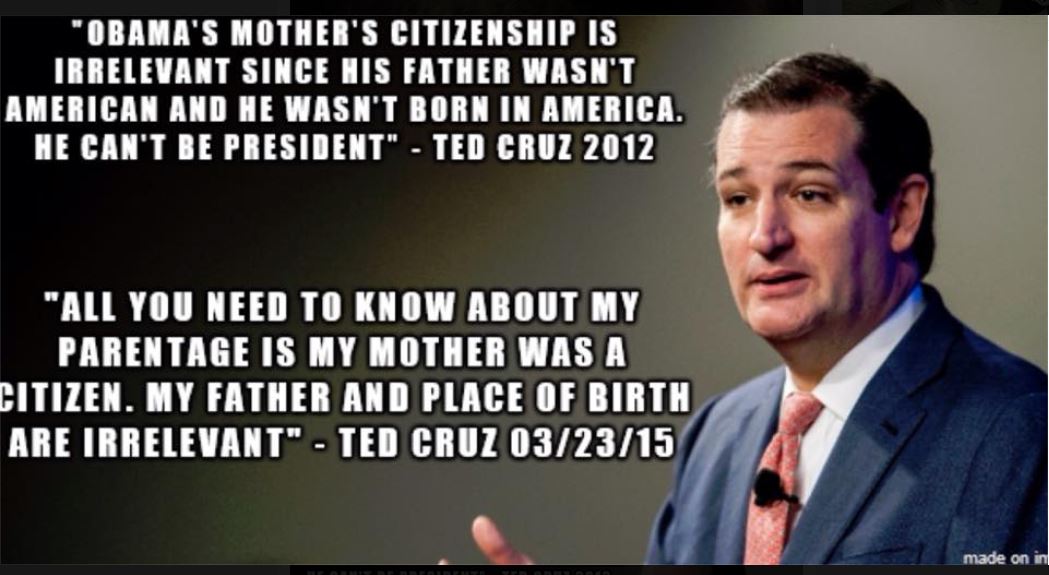Skylar
Diamond Member
- Jul 5, 2014
- 52,660
- 15,670
- 2,180
i know, the birther thing again, doesn't seem to want to go away.
anyway republicans want sick people to die quickly. grayson is back. he is the dizzying hugo chavez of our American congress.
Alan Grayson Threatens Lawsuit on Citizenship Grounds if Ted Cruz Is the GOP Nominee - Breitbart
if you google die quickly, you get this:
COLMES: Well, his mother was born here, so I guess like Obama, though it’s interesting to me the people who had a problem with Obama, though it’s interesting to me that the people who had a problem with Obama’s birth certificate don’t have a problem with Ted Cruz who literally was born in another country and renounced his Canadian citizenry.
GRAYSON: I don’t know … the Constitution says natural-born Americans, so now we’re counting Canadians as natural born Americans? How does that work? I’m waiting for the moment that he gets the nomination and then I will file that beautiful lawsuit saying that he’s unqualified for the job because he’s ineligible.
COLMES: So you’re saying should he get the nomination, Alan Grayson will file a lawsuit against his candidacy.
GRAYSON: Absolutely! Call me crazy but I think the president of America should be an American.
COLMES: Now I wonder, does he qualify because of having an American mother can considered an American citizen and in fact he renounced his Canadian citizenship to be an American citizen, but you’re talking about American birth, but I believe if that’s one of you parents —
GRAYSON: Look, even the anchor babies are actually born here. He doesn’t even meet that qualification.
COLMES: Right. And although I don’t like the term anchor babies, it’s been embraced by people like Donald Trump and Ted Cruz — not Ted Cruz — Marco Rubio who may in fact be one, as I understand.
GRAYSON: Oh, it’s shocking. In Cruz’s case, it is obvious what happened. The Canadians got pissed off at us for acid rain, so they gave us Ted Cruz.
grayson is not considered to be one of the high intellectuals of the DC congress...
alan colmes is just plain creepy.
Good for Grayson.
You're upset about the Obama birther sham, but you are more than willing to challenge the citizenship of a Republican senator. Lol.
Who's the kook now?
If Cruz was born in Canada he has the same problem former Michigan governor Jennifer granholm has. That's as far as she can go because she was born in Canada.
Sounds to me like Cruz ain't denying he's a wetback from the great white north aye?
Or Arnold swartzanigger.
It's hypocrisy at it's best. Cruz was all Over Obama about a birth certificate--when he, himself wasn't born in the United States. What a Tea Party member (will never consider) is: If Cruz is the nominee, what will Democrats do with this information. They are going to raise a huge stink about it, is what they're going to do.

Democrats are also going to put the below video out on a 24/7 hour loop, in an advertisement.
Cruz didn't say either of those two things. So Democrats probably aren't going to do much with either.
They're also going to bring up his attendance at a Gay Hate party, a couple of weeks ago, where the speaker was calling for executions of Gay People
WATCH: Rachel Maddow Breaks Down Pastor's 'Kill the Gays' Rally Attended by GOP Candidates | Advocate.com
This is the problem with the far right of the Republican Party. They don't understand the make-up of the electorate that won't vote for far right candidates. They think that the majority of the Republican party think like them, and they don't realize that they represent less than 20% of the party. They also don't know that Republicans are the minority party, and independents are a must win to win the White House. Yet they continually put up far Religious right candidates, that don't have a snowballs chance at winning a National election, and are only good for a lot of negative news coverage.
A Race to the Bottom on Women's Rights
If Ted Cruz is the GOP nominee, he will get steam rolled and buried on election night.
Republicans are often under the bizarre 'what the country wants is a real conservative' mantra. Which just doesn't make sense.
Fringe right conservatives find their most fertile ground among republicans. And even republicans don't want them. Why then would far less conservative moderates and liberals want them? Moderates and liberals making up the majority of the electorate and all.
Its a simple math problem. One that these republicans are cognitively aware of. But one they are emotionally unwilling to accept. So presidential elections are often a demonstration of the accuracy of truthiness.
With 5 of the last 6 votes of the electorate going to Democratic candidates.
 . but also had nothing to do with someone running for president. Why the indiana court would comment on that is difficult to understand.....if they did it was an aside and has no legal authority.
. but also had nothing to do with someone running for president. Why the indiana court would comment on that is difficult to understand.....if they did it was an aside and has no legal authority.